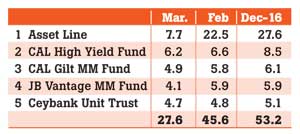Reply To:
Name - Reply Comment
Sri Lanka’s unit trust industry has seen a massive withdrawal of funds during the first three months of the year with deeper erosion of assets taking place during March, the final month before the new taxes may come into effect.
Sri Lanka’s fund management industry decried the new taxes proposed by the budget 2017 to be effected from April 1, 2017, as the enacting of such would decide the fate of the industry, which has about Rs.100 billion Assets Under Management (AUM). 
According to the data released by the Unit Trust Association of Sri Lanka, the largest five unit trust funds in Sri Lanka, which had a combined AUM of Rs.53.2 billion by the end of December 31, 2016, have seen their assets almost halving to Rs.27.6 billion by March 31, 2017.
Of the first three months, March saw Rs.18 billion worth of assets being withdrawn, probably the largest withdrawal of assets in a single month.
For instance, Assetline Gilt Edged Fund, the country’s largest unit trust fund managed by Assetline Capital (Pvt) Limited., a unit of David Pieris Group, which had AUM of Rs.27.6 billion by end of 2016 saw its AUMs coming down to Rs.22.5 billion by the end of February 2017.
Between March and April, the fund’s AUM fell to just under Rs.7.7 billion, probably demonstrating the investor panic over the looming new taxes.
The budget 2017 proposed to remove withholding tax exemption on dividends received by a corporate unit holder and the profits earned by a unit trust company, making them liable for 14 percent income tax as opposed to the exiting 10 percent. Also it was proposed to make the redemption of units liable for taxes, which were hitherto exempted.
“Obviously the impact is going to be huge. Potentially this (AUM) is going to drop significantly by 1st of April as the corporates who are now on a wait-and-see mode on the taxes will withdraw their funds, said Dilshan Wirasekara, CEO of First Capital Holdings, an investment bank, in a note this March.
The removal of the exemption of withholding tax on dividends received by a corporate unit holder was particularly targeted at those corporates who circumvent the tax net by way of investing in unit trusts.
In Sri Lanka, corporates own over 80 percent of the Rs.100 billion AUM in the unit trust industry while only the balance 20 percent is owned by individual unit holders.
Although the unit trusts were introduced into Sri Lanka with the intention of promoting share ownership among a wider section of the society, this appears to have remotely achieved even after nearly three decades into introducing such investment instruments.
To put things into perspective, there are not more than 40,000 unit holders in Sri Lanka for a population of 23 million.
However, the looming new taxes may have prompted some of the corporates to withdraw their funds which in turn would have led to the erosion of the AUMs during March in particular.
But to-date, none of those proposed taxes have come into effect as the Finance Ministry has failed to gazette the new tax amendments.
Nevertheless the country’s former Finance Minister, Ravi Karunanayake told reporters this month that he would tax profits of unit trusts at 10 percent for individuals and at a higher rate for corporates. But the enactment of such proposals now hangs in the balance due to a cabinet reshuffle, where Karunanayke had to swap ministries with Foreign Minister Mangala Samaraweera.